Social Media “Influencers” and the Promotion of the Ikhwānī Slogan: “We Cooperate with One Another Regarding That Which We Agree Upon, and Forgive One Another in That Which We Differ Concerning.”
Imām Muḥammad Nāṣir al-Dīn al-Albānī, Imām Muḥammad ibn Ṣāliḥ al-ʿUthaymīn


The Emergence of the Insta-Shaykh in Today’s Digisphere
The social media era has swung the doors of fitnah wide-open, allowing pretenders to feign knowledge in cutely curated digital shorts that tantalise with clickbait headlines. These pretenders utilise things like Instagram stories, YouTube shorts and pundit-styled live podcasts that promise to address “hot topics”. Borrowing the digital strategies of so-called digital “influencers”, these techniques are used to make inroads with the young Muslim audience. One such pretender, Abu Taymiyyah, recently apologised to his former sūfī teacher, a prominent grave-worshipper responsible for guiding thousands of Muslims toward shirk. We noted and exposed this kindness and lenience with a deviant figurehead:
Former Grave Worshiper Regrets his Harsh Dealings With Fellow Grave Worshipping Sufī Teacher Who He May Have Disrespected and Issues an Apology.
May Allāh have mercy upon Imām al-Shāfi’ī who said:
“No one has ever accompanied the Sufīs for 40 days and kept their sanity”.
This… pic.twitter.com/h4azszqZ73
— troid.org (@troidorg) July 26, 2023
Severe upon the People of Sunnah, Lenient with the People of Innovation
Abu Taymiyyah went into damage control, and typical of his fraternity, moved to recycle old tired claims against the Salafis labelling them as: “extremists” with a “narrow-minded thought process and misunderstood way of the ‘salaf'”. Suddenly, the call to kindness and leniency evaporated. As always, sympathetic with the people of innovation and severe upon the people of sunnah. To defend his stance of standing hand-in-hand with ikhwānī leaders, he cunningly tweeted a video of the noble scholar, Shaykh Ṣāliḥ al-Fawzān, trying to demonstrate to his young audience that it is acceptable to work with and remain silent about the errors of ikhwānī figureheads, open opponents to the manhaj of the salaf.
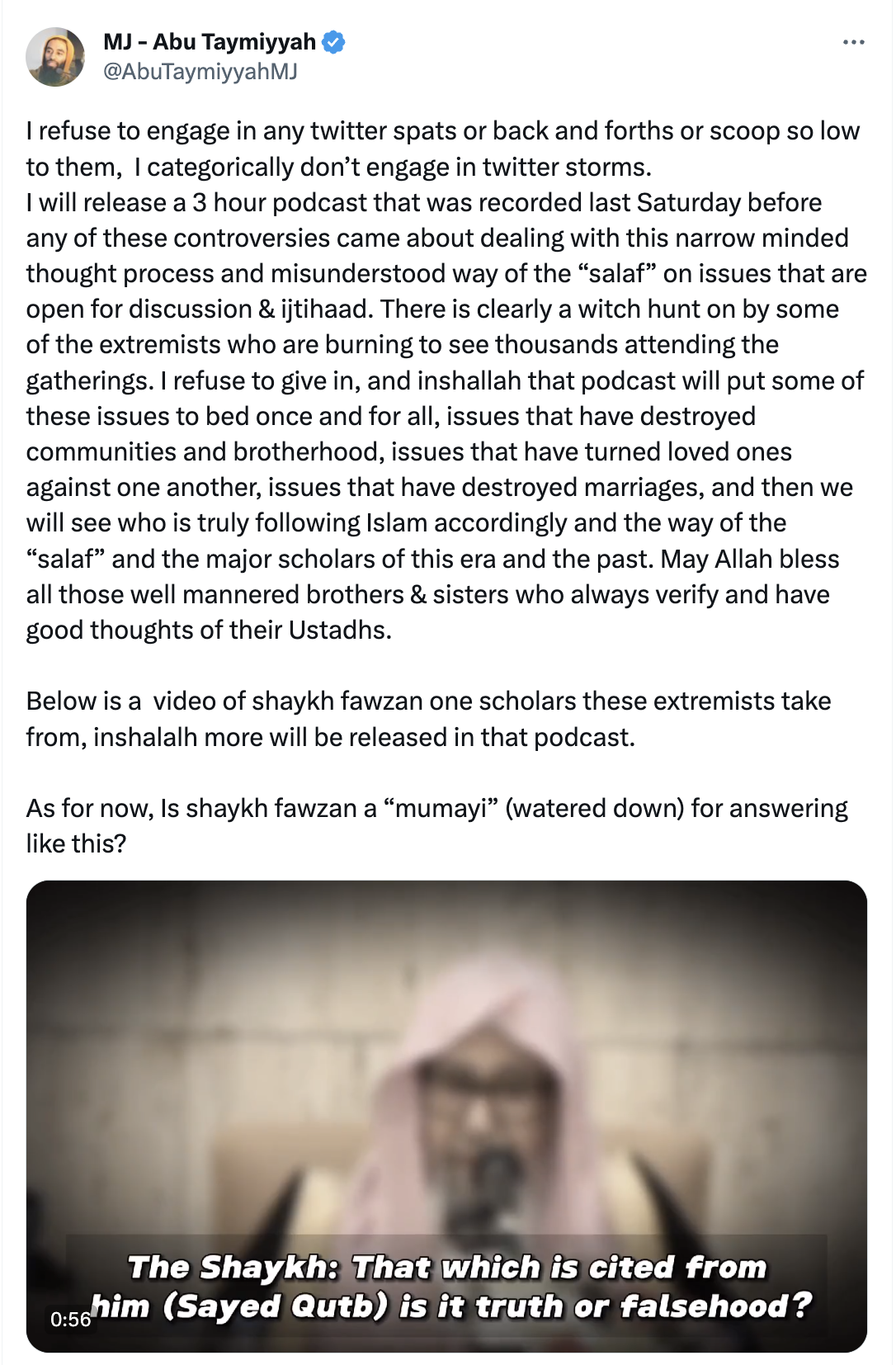
Mockingly, he suggests: “Is shaykh fawzan a “mumayi?” (watered down) for answering like this?” It is not unbeknown to Abu Taymiyyah that Shaykh al-Fawzān, much like the consensus of the scholars of today and yesteryear, were diametrically opposed to the The Muslim Brotherhood, a group that has been at the apex of distorting the Islamic ʿaqīdah with their message of tossing asides the affairs of creed and the books of creed in favour of the melting pot of political activism which is focused on increasing numbers and increasing turmoil and revolt in the Muslim lands. If it were unknown to Abu Taymiyyah, then even more reason to leave off this insta-shaykh. Note also, that he wishes to quickly steer his audience away from the tweet storm of corrections that expose his stances, showing that they are in opposition to the manhaj of the salaf, as illustrated by the speech of the scholars. He deftly tries to push them off Twitter and towards an upcoming podcast where he can steer them away from the truth in the matter.
The Reality of the Muslim Brotherhood and Shaykh al-Fawzān’s Clarification
In response, we posted one piece of clarification from Shaykh al-Fawzān on this issue, and make no mistake, there is many a quote from this illustrious scholar on the Muslim Brotherhood and political activism and uprising. Decade after decade, the Muslim world has suffered from the machinations of this movement.
‼️Shaykh Ṣāliḥ al-Fawzān Clarifies His Statement “The Muslim Brotherhood are from Ahl al-Sunnah”
Al-ʿAllāmah Ṣālīḥ ibn al-FawzānAll praise is due to Allāh, and Ṣalāt and salām upon our Prophet Muḥammad, his family, and his companions.
My view with regards to the Muslim…
— troid.org (@troidorg) July 27, 2023
Incidentally, we had published this exact statement and clarification from Shaykh al-Fawzān more than a decade ago entitled: Shaykh Ṣāliḥ al-Fawzān Clarifies His Statement “The Muslim Brotherhood are from Ahl al-Sunnah”. This is the handwritten note of the Shaykh (for those who wish to claim ambiguity in this matter):
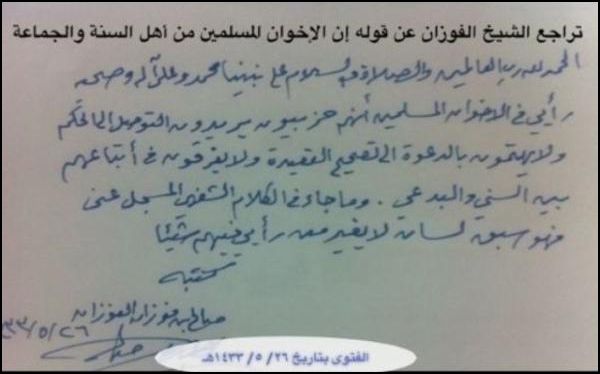
Rushing to Defend Abu Taymiyyah and the Ikhwanī Golden Rule of Co-operation
Unsurprisingly, the confusion caused by Abu Taymiyyah to his followers was lauded by like-minded ikhwānī sympathisers such as Mustafa Abu Rayyan who is Imām and head of daʿwah/outreach at Green Lane Masjid, Birmingham, England. More than 25 years ago, our noble elders and students of knowledge at Salafi Publications raised the alarm on the ikhwāniyyah of Suḥayb Ḥasan and the leaders of Green Lane, who warned against the salafī duʿāt and more sinisterly introduced ikhwānī principles of cooperation to Muslims in the UK. This Mustafa is the fruit of their loins so-to-speak. Nowadays, apparently there is little need to pull the wool over anyone’s eyes, it is open flag-bearing of ikhwānī principles now. Here are the statements of this Mustafa Abu Rayyan in support of Abu Taymiyyah’s apology to a sūfī grave-worshipping figurehead:
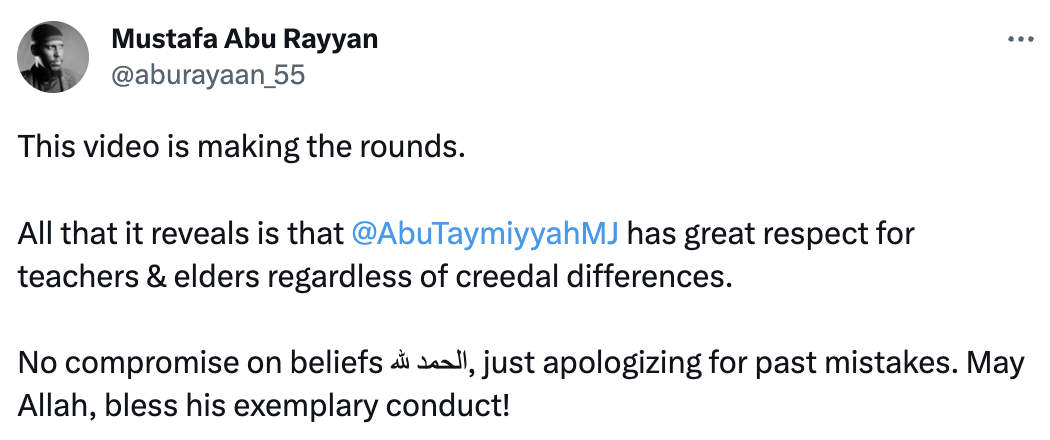
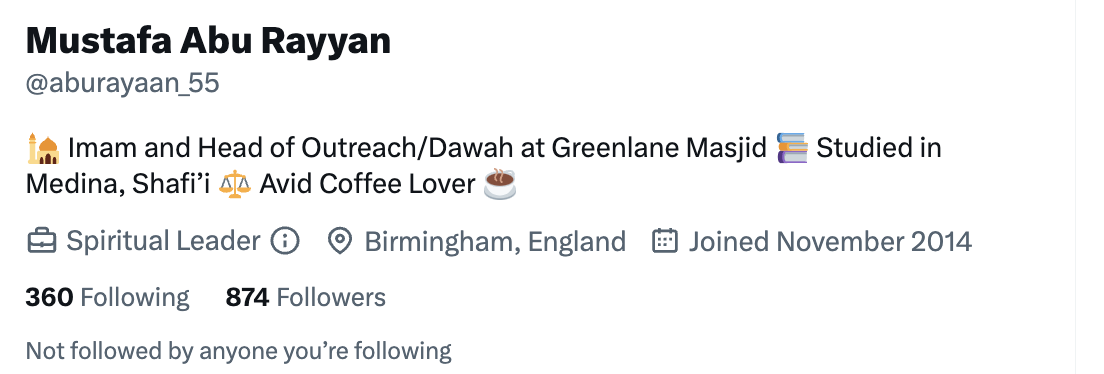
Mustafa Abu Rayyan loves Abu Taymiyyah’s approach and we can understand why, as he tweeted earlier this year:
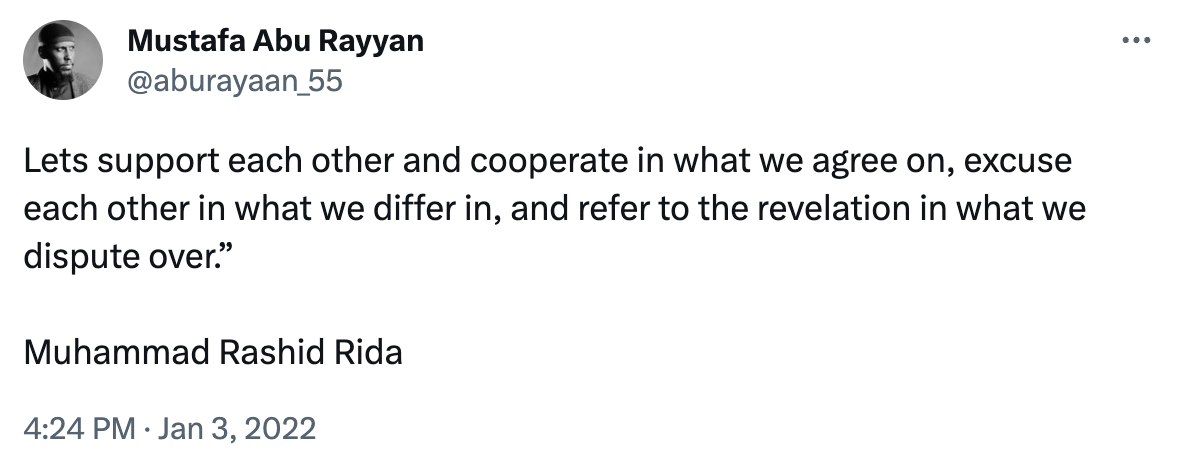
Now this is the same Abu Taymiyyah who has no respect for “extremists” as he calls them (i.e. the Salafis) whilst he has “great respect” for Sufis “regardless of credal differences” as Mustafa Abu Rayyan giddily notes. How easily they relegate the affairs of creed to the wastebasket of nothingness!
So, in light of this, we compare and contrast their positions with the clarifying speech of the illustrious scholars, Shaykh Muḥammad Nāsir al-Dīn al-Albānī and Shaykh Muḥammad ibn Ṣāliḥ al-ʿUthaymīn on issues of creedal differences and cooperating on that which we agree upon.
Let the seeker of truth, the desirer of good, arrive at allegiance to the truth and its people:
[Q]: What are the true implications of the phrase: “We cooperate with one another regarding that which we agree upon, and forgive one another in that which we differ concerning.”
Shaykh Nāṣir al-Dīn al-Albānī [d. 1420 AH] answers:
[A]: Yes, some of the callers to the religion of Islām repeat this phrase often. Our opinion regarding them is that they are general callers to the religion of Islām—general Islām.
As for the callers to Islām whose point of reference is the Book of Allāh and the Sunnah, upon the methodology of the pious predecessors—we do not know of a group that calls to this way of truth except that they announce to the people identifying themselves as the people of ḥadīth, or as defenders of the Sunnah, or followers of the pious predecessors. As for these other groups, they do not make such announcements. Rather, they suffice in saying: We are in agreement with you insofar as the Book of Allāh and the Sunnah is concerned. Even these are words that they find themselves unable to implement fully and completely. This is because they have only studied a very small proportion of this sharīʿah in light of the Book of Allāh and the Sunnah.
Thus, they say: “We cooperate with one another regarding that which we agree upon, and forgive one another in that which we differ concerning.” This sentence is grammatically correct, if a caveat is placed on it. As for the first part, there is no problem with regards to it: “We cooperate with one another regarding that which we agree upon”, but the second part requires some review: “We forgive one another in that which we differ concerning”. This second part may be understood correctly with the condition which is: “We forgive one another in that which we differ concerning after offering the obligatory, sincere advice:” [The Prophet (صلى الله عليه وسلم) said:] “This religion is sincere advice; this religion is sincere advice; this religion is sincere advice.” We replied: “To whom?” He replied: “To Allāh, His books, the Imāms of the Muslims, and their general populace.”1
Thus, if we [the generality of the Muslims] find ourselves differing with one another, even if be in the testification: “There is nothing worshipped in truth except for Allāh,” then it is most unbefitting that we leave such differences under the guise of this statement: “We forgive one another in that which we differ concerning.”
Rather, it is obligatory upon us to seek a ruling and judgement from the Book of Allāh and the Sunnah of the Messenger of Allāh (صلى الله عليه وسلم) and that we all attempt to come as close to this practice, adopting its way. We are unable to simply be satisfied with this difference, especially if it is related to our creed. This is because creed is a matter that does not accept differences of opinion.
This is contrary to issues that are collectively termed masāʾil farʿiyyah [branching issues or off-shoots]. These branches may have some differences of opinion. However, even with regards to them, sincere advice is still obligatory. If sincere advice is given regarding these issues, but both parties remain on the opinion they had originally adopted, then at that point we may use this statement: “We forgive one another in that which we differ concerning.”
As for simply allowing a difference of opinion and opposition to exist as is, under the guise of “we forgive one another”, without ever attempting to quell this difference as much as we are able, then this negates the āyāt and aḥādīth that command our ranks to be united. From among the greatest methodologies used to accomplish a united front and united ranks is, as the Most High said:
فَإِن تَنَازَعْتُمْ فِي شَيْءٍ فَرُدُّوهُ إِلَى اللَّهِ وَالرَّسُولِ إِن كُنتُمْ تُؤْمِنُونَ بِاللَّهِ وَالْيَوْمِ الْآخِرِ ۚ ذَٰلِكَ خَيْرٌ وَأَحْسَنُ تَأْوِيلًا
“(And) if you differ in anything amongst yourselves, refer it to Allāh and His Messenger (صلى الله عليه وسلم), if you believe in Allāh and in the Last Day. That is better and more suitable for final determination.”
(Al-Nisāʾ4:59)
We know well that the ones who often say this statement believe differences of opinion to be a part of this sharīʿah and that they must undoubtedly occur. However, we oppose them in this stance with great severity. We say: We must seek judgments—always and forever—from the Book of Allāh and the Sunnah of the Messenger of Allāh (صلى الله عليه وسلم). If, after this, there still exists some differences among us [in matters not related to creed], we shall not be divided because of it, or turn our backs on one another.
In this point, we have the example set by the companions of the Prophet (صلى الله عليه وسلم). For they used to struggle with another in pursuit of the truth. They refused to be silent, even if they found their khalīfah opposing an established ruling. Rather, they would object to this opposition. If their ruler then continued upon the same opinion, they would not revolt against him, or show enmity towards him. They would reply to him with questions [concerning his actions]. Then, if he ordered them to wage war in the way of Allāh [at its appointed time], they would all fight in the way of Allāh [alongside him], even though they had some differences of opinion amongst them.
From among the well-known examples of this is when ʿUmar ibn al-Khaṭṭāb (رضي الله عنه) forbade the people to perform ʿUmrah and Ḥajj together. He had a famous opinion on this issue which permitted him to issue such a ruling. However, the other companions differed with him in this matter. Even though this opinion was then adopted by the khalīfah who came after him—ʿUthmān ibn ʿAffān (رضي الله عنه). Even considering this, we find in Ṣaḥīḥ Muslim that ʿAlī (رضي الله عنه) came to ʿUthmān ibn ʿAffān saying: “Why have you forbade the people from performing Tamattuʿ—combining Ḥajj and ʿUmrah [in one trip]?” He replied: “Leave me with it,’ that is, he did not have any evidence to support this view. He [ʿAlī (رضي الله عنه)] replied: “I will not leave you. O Allāh! I come in answer to you for the performance of Ḥajj and ʿUmrah [together].’ He opposed him with the Sunnah which he knew from the Messenger (صلى الله عليه وسلم). As ʿAlī (رضي الله عنه) was in Yemen at the time the Prophet (صلى الله عليه وسلم) performed his final pilgrimage. Of course, when the news reached him that the Prophet (صلى الله عليه وسلم) was making preparations for Ḥajj to the Holy House of Allāh, ʿAlī (رضي الله عنه) left Yemen with the intention of performing Ḥajj. When he then met the Messenger (صلى الله عليه وسلم) in Makkah, he (صلى الله عليه وسلم) asked him: “What did you say when you declared your intention?” He replied: “With whatever the Prophet (صلى الله عليه وسلم) has declared.” That is, he left it open-ended without saying “O Allāh I am coming in answer to you for Ḥajj,” or “for ʿUmrah,” or “for Ḥajj and ʿUmrah.” Rather, he said: O Allāh! I come in answer to you to perform the Ḥajj the same as that of the Prophet (صلى الله عليه وسلم).” He (صلى الله عليه وسلم) replied: “Indeed, I am Qārin [combining Ḥajj and ʿUmrah without removing the iḥram]. Thus, ʿAlī (رضي الله عنه) knew that the Prophet (صلى الله عليه وسلم) was Qārin.2
Then, when the rightly guided khālif, ʿUthmān, forbade that Ḥajj and ʿUmrah be combined, he [ʿAli (رضي الله عنه)] opposed and differed with him saying: “O Allāh! I come in answer to you to perform Ḥajj and ʿUmrah together.” Even in consideration of this, there did not exist any alienation between them nor animosity. Rather, their ranks remained tight. This is how the Muslims will return to that golden age. All goodness is present in following the pious predecessors and only evil is found in the innovations of the latter generations.3
[Q]: Honourable shaykh! It is well-known that the Shīʿah and the Murjiʾah have great differences with Ahl al-Sunnah. There is a rule that some of the “scholars” have which they named ‘the golden rule’: “We cooperate with one another in that which we agree upon and forgive one another in that which we disagree concerning.” How can we ever forgive these Shīʿah?
Shaykh Muḥammad ibn Ṣāliḥ al-ʿUthaymīn answered:
[A]: This ‘golden rule’ is not golden, nor does not it deserve the title of a ‘rule.’ Rather, it is from the blessings of Allāh—the Exalted in Might—that we find agreement on certain matters. Agreement is better than dissension and division. As for that which we have differed with one another regarding, we may forgive the one who opposes us or we may not. If the matter of difference is related to that which is permissible for there to be a difference of opinion, then there is nothing wrong with this. As the Imams continue to differ with one another, just as Imām Aḥmad, Shāfiʿī, Mālik, and Abū Ḥanīfah differed with one another [in matters of jurisprudence].
However, if the matter is one wherein a difference of opinion is not forgiven like that of creed, then we shall not forgive one another in that. Rather, it is obligatory in these matters to return to the Book of Allāh and the Sunnah. Thus, it is obligatory on the Murjiʾah, the Shīʿah, and every innovator to return to the Book of Allāh and the Sunnah without any sort of forgiveness [if they choose not to]. This rule is, therefore, not a golden rule. It is more befitting to be called a wooden rule if anything.
You should know now the matters in which it is permissible for there to exist ijtihād [scholarly effort in pursuit of the truth in a judicial issue]. As for the issues that are not accepting of ijtihād like matters of creed which people choose to oppose the pious predecessors concerning, they cannot be forgiven.4
He (رحمه الله) also said:
This statement is false in both its parts. As for the sentence ‘we forgive one another in that which we differ concerning,’ it is like the saying of some of the jurists: ‘There is no objection in issues of ijtihād.’ This is a famous statement with the jurists. It is an incorrect statement if left in this encompassing fashion. This is because, concerning matters of difference, if the truth has not been clarified to the extent that the opponent’s ignorance of it cannot be forgiven, then here we may forgive the opposition. As, in this situation, he has an opinion and we have our opinion. However, if the truth is plainly evident, then here we do not excuse the opposition. Thus, this statement when left in this encompassing fashion is incorrect.
As for the second part: ‘we cooperate with one another in that which we agree upon,’ this is also incorrect. This is because if we agree upon that which is falsehood, it would then be impermissible for us to cooperate with one another with regards to it. Rather, we should forbid one another from engaging in this falsehood instead. So this statement, when left in this encompassing fashion, is also incorrect. It may be that the one who considers this part correct [like Shaykh al-Albānī as aforementioned] is referring only to the matters that are not from falsehood or contrary to the sharīʿah.
The first sentence is used by groups who have deviance in their creed and methodology but still fall under the umbrella of Islām. So they say: We should all seek shade under the umbrella of Islām, even if we differ with one another. It is for this reason that you find them allowing into their congregations clear, rebellious, sinners like those who shave their beards, or smoke cigarettes, or are careless regarding ṣalāh, and the likeness of such traits. Conversely, those who wish for all of the people to be completely righteous in every minor and major aspect of their lives otherwise they are not our brothers, this is also a mistake.5
Endnotes:
[1] Authentic: narrated by Muslim: 55, Abū Dāwūd: 4944 and Nasāʾī: 4235.
[2] Authentic: narrated by Muslim, the occurrences mentioned here are an amalgamation of the hadiths: 141, 158, 159.
[3] Source: Jāmiʿ Turāth al-ʿAllāmah al-Albānī 3:75.
[4] Source: Liqāʾ al-Bāb al-Maftūḥ 25: 75.
[5] Source: Tafsīr al-Uthaymīn 2:15.
Translated by: Riyāḍ al-Kanadī
Advice to Those Who Have Been Enamoured with Daʿwah of Abu Taymiyyah
We encourage our brothers and sisters who have developed an affection for this individual to examine the evidences. Focus on the principles not the personality. Understand the wise words of the illustrious Imām, Muḥammad ibn ʿAbd al-Wahhāb when he demonstrated how the people of the past could not let go of their beloved, even with the truth was presented to them, even if it seemed fair and evident, they were stubborn and defiant.
Imām Muhammad b. Abd al-Wahhāb mentions the initial impression of the Mushrikūn regarding the daʿwah of the Prophet (صلى الله عليه وسلم)
“…they deemed it to be good and considered entering into it until he explicitly criticised their religion and deemed their scholars to be ignorant. At that time, they ignited the flames of enmity towards him and his Companions.” (ستة مواضع)
This indicates to us if we warn against shirk and bidʿah generally, it may be accepted, but once we start naming names and being explicit as was the daʿwah of the Prophet (صلى الله عليه وسلم), the acceptance rate will drop and the backlash will increase. Ahl al-Sunnah refute explicitly without ambiguity or beating around the bush, whether people like it or not.
Most Popular: Last 30 Days

















